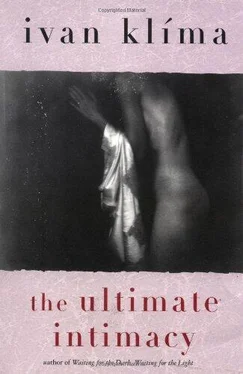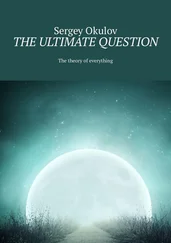Ivan Klima - The Ultimate Intimacy
Здесь есть возможность читать онлайн «Ivan Klima - The Ultimate Intimacy» весь текст электронной книги совершенно бесплатно (целиком полную версию без сокращений). В некоторых случаях можно слушать аудио, скачать через торрент в формате fb2 и присутствует краткое содержание. Год выпуска: 1998, Издательство: Grove Press, Жанр: Современная проза, на английском языке. Описание произведения, (предисловие) а так же отзывы посетителей доступны на портале библиотеки ЛибКат.
- Название:The Ultimate Intimacy
- Автор:
- Издательство:Grove Press
- Жанр:
- Год:1998
- ISBN:нет данных
- Рейтинг книги:3 / 5. Голосов: 1
-
Избранное:Добавить в избранное
- Отзывы:
-
Ваша оценка:
- 60
- 1
- 2
- 3
- 4
- 5
The Ultimate Intimacy: краткое содержание, описание и аннотация
Предлагаем к чтению аннотацию, описание, краткое содержание или предисловие (зависит от того, что написал сам автор книги «The Ultimate Intimacy»). Если вы не нашли необходимую информацию о книге — напишите в комментариях, мы постараемся отыскать её.
The Ultimate Intimacy — читать онлайн бесплатно полную книгу (весь текст) целиком
Ниже представлен текст книги, разбитый по страницам. Система сохранения места последней прочитанной страницы, позволяет с удобством читать онлайн бесплатно книгу «The Ultimate Intimacy», без необходимости каждый раз заново искать на чём Вы остановились. Поставьте закладку, и сможете в любой момент перейти на страницу, на которой закончили чтение.
Интервал:
Закладка:
'You certainly do look a bit poorly,' Hana comments and she too advises him to take care of himself. Then she adds, 'Whenever you're feeling downhearted like that you're welcome to call us or just drop by. My husband might help raise your spirits.'
'I'd sooner come to visit you, Matron. And talking about visits, it's your turn to visit me, isn't it?'
'Take a seat then.' It looks as if both his attempt at flattery and his
invitation have passed unheeded. She asks him if he'd like a cup of tea and when he accepts her offer, Hana takes two cups from the metal cupboard, and after apologizing that she only has ordinary teabags she goes off somewhere. For a moment, Matouš looks around the room in which everything is coldly white; the refrigerator hums quietly and specks of dust swirl in the rays of sunlight. He then takes out his notebook and spends a moment composing a three-liner.
The pastors wife returns with the small teapot from which steam now rises and asks him if he is already back at work.
He explains to her that his work consists of writing something and taking it to an editor. He also tells her that he doesn't really enjoy journalism and has never particularly enjoyed it.
'What would you enjoy doing, then?'
He says he once spent a lot of time studying Chinese philosophy. He found it a source of reassurance when the Communists were in power. Things were bad in China too during the rule of the first emperor of the Ching dynasty. For the first time in history they burned books and ownership of them was actually punishable by death. But the emperor died and ying — the spirit of conciliation and love — was restored. He has also translated and written verse, he tells her. He would like to publish his poems, but whereas in the past it wasn't possible because his poetry was not sufficiently optimistic or politically committed, nowadays no one's interested in publishing poems, unless he pays them to. He opens his notebook and reads out his newly written tercet:
Even the river
will melt when over the waves
flash flocks of black coots.
Matron Hana nods. She is unlikely to see anything poetical in the statement, let alone realize he wrote the lines to impress her. She used to read poetry, she says, but it was a long time ago, these days she doesn't have the time.
'These days nobody has the time,' Matouš says. 'Either for poetry or for living. Life rushes on and from the emptiness one knows one falls into the emptiness one doesn't. And what will one leave behind here? You will leave behind children. But what will remain after me? A bed, a couple of dictionaries and books and a few tattered clothes.'
'Everyone leaves something behind,' Hana disagrees, 'providing they've lived decently. And those poems of yours,' she recalls, 'I'd like to read them now I know you.'
'I'll bring them to you, or I'll show them to you when you visit me.'
At that moment, some nurses burst into the office and Hana no longer has any time for him, nor, clearly, can she pay him attention.
So Matouš gets up and as he is leaving suggests that he might wait lor Hana at the gate.
'But I won't be finished for nearly an hour,' Hana objects. But that is not the sort of objection that would put him off.
But just for a moment,' Hana says when they meet. 'You know they're waiting for me at home.'
He escorts her to the same bistro as last time and on this occasion he offers her a glass of wine. Hana declines and just has a coffee.
They chat for a while about Matouš s health and the tablets that don't relieve his condition.
'Once when I was travelling westwards from Peking,' Matouš recalls, 'I got a swelling of the knee. There was no doctor in the vicinity so they brought me to the local soothsayer who was also a healer. She tried to find the cause of the illness. Your grandfather on your fathers side, she said to me, suffered from leg trouble, until in the end he was unable to walk. And when he was dying he didn't have his walking stick with him.'
'Was it true?'
'I don't know whether he had his stick with him or not, I wasn't horn then. But apparently he suffered with his legs and before he died he was unable to walk. So that old woman advised me to cut a walking stick out of paper and burn it at the crossroads at full moon in order to appease the suffering of my grandfather's spirit, and then I would find relief.'
And did you do it?'
'What harm was there in trying? It happened to be the day before the full moon.'
'But the spirit of your grandfather. . After all, your grandfather didn't live in China.'
'I have no particular belief in ghosts, Matron, or in the survival of the spirit, but if ghosts did indeed survive somewhere, then I expect they could accompany us on our travels.'
'And did it help you?'
'I don't know. The swelling went down and the knee hasn't hurt me since. Now it's my stomach that hurts me and I don't know which of my forebears I'm supposed to appease.'
Then he tells Hana about his troubles with Klára, from whom he is getting a divorce. Hana is sure this is the real cause of his pain.
'Do you know I never used to have any fear of solitude,' Matouš confides to her, 'nor of death, for that matter. I didn't think about it. While you're still young, you have the feeling that everything is opening up before you, and in fact you shun any commitments that might bind you. But then the dread of solitude descends upon you. On that point I differ from the sages I have read about. The wisest of them, once they had fulfilled their obligations towards their family and brought up their children, went away to a monastery or to some isolated hermitage and there they devoted themselves to contemplation and to understanding the Order. I haven't managed the first and I'm not even prepared to do the other. What else can I expect from life now? At best a nursing home.'
'But you're not going to stay on your own, are you?' Hana says. 'An interesting person like you.'
Matouš objects that no one is interested in what he has experienced or seen, nor the things he knows. Particularly not women.
'You're wrong there. Almost all women yearn for something different, for some change.' She stops short, and then says, 'I know this from our congregation and from the hospital; I know what the women talk about.'
Maybe she is only consoling him. Maybe she is only passing on the experiences of others. But most likely she is speaking about herself. Matouš would like to stroke her hand, at least, but he is shy to do so here in a bar where there are lots of people. Besides, he is afraid it might startle the pastor's wife and frighten her away.
It occurs to Hana to ask whether it really costs so much money to get a poetry collection published.
Matouš explains that it depends what one means by a lot of money, but in any event it would have to be at least enough for a publisher, if there was one, not to suffer a loss.
'I'll ask my husband,' Hana promises. 'Perhaps we could give you something towards it.'
'I couldn't possibly ask you to do such a thing.'
'Why not? People should help each other.'
'You're an angel, Matron.'
Hana waves her hand as if to ward off his words.
'No,' Matouš says, you're completely different from other women.'
'Different?'
'Better.'
Hana blushes, then says it is time she was going. So Matouš pays the bill and then before they part he repeats his invitation. Hana should come and see his collections. She says she's not sure that her husband will have the time, but Matouš may visit them whenever he likes. She will be pleased to see him and looks forward to the poems. The manse is there for people to come to whenever they feel low in spirits.
When Matouš gets home, he realizes that his stomach pain has gone. He makes himself another pot of tea and lies down fully dressed on the unmade bed. He makes up his mind to get rid of Klára once and for all, and when the pastor dies, he'll marry his widow.
Читать дальшеИнтервал:
Закладка:
Похожие книги на «The Ultimate Intimacy»
Представляем Вашему вниманию похожие книги на «The Ultimate Intimacy» списком для выбора. Мы отобрали схожую по названию и смыслу литературу в надежде предоставить читателям больше вариантов отыскать новые, интересные, ещё непрочитанные произведения.
Обсуждение, отзывы о книге «The Ultimate Intimacy» и просто собственные мнения читателей. Оставьте ваши комментарии, напишите, что Вы думаете о произведении, его смысле или главных героях. Укажите что конкретно понравилось, а что нет, и почему Вы так считаете.






![Theresa Cheung - The Dream Dictionary from A to Z [Revised edition] - The Ultimate A–Z to Interpret the Secrets of Your Dreams](/books/692092/theresa-cheung-the-dream-dictionary-from-a-to-z-r-thumb.webp)





